Chinese citizens have responded with anger to Lotte Group’s decision to enable the deployment of the US Terminal High Altitude Area Defense (THAAD) system in South Korea. Many shoppers in the world’s most populous country have vowed to boycott the South Korean conglomerate’s businesses in response to its actions.
Lotte Group, which owns over 100 marts and five department stores in China, has been under fire as a result of the conglomerate’s role in South Korea’s deployment of THAAD, which Seoul and Washington say is needed to defend against the DPRK’s missile threat.
But THAAD’s radar is capable of penetrating Chinese territory, which Beijing says is a threat to its security and will do nothing to ease tension with the DPRK.
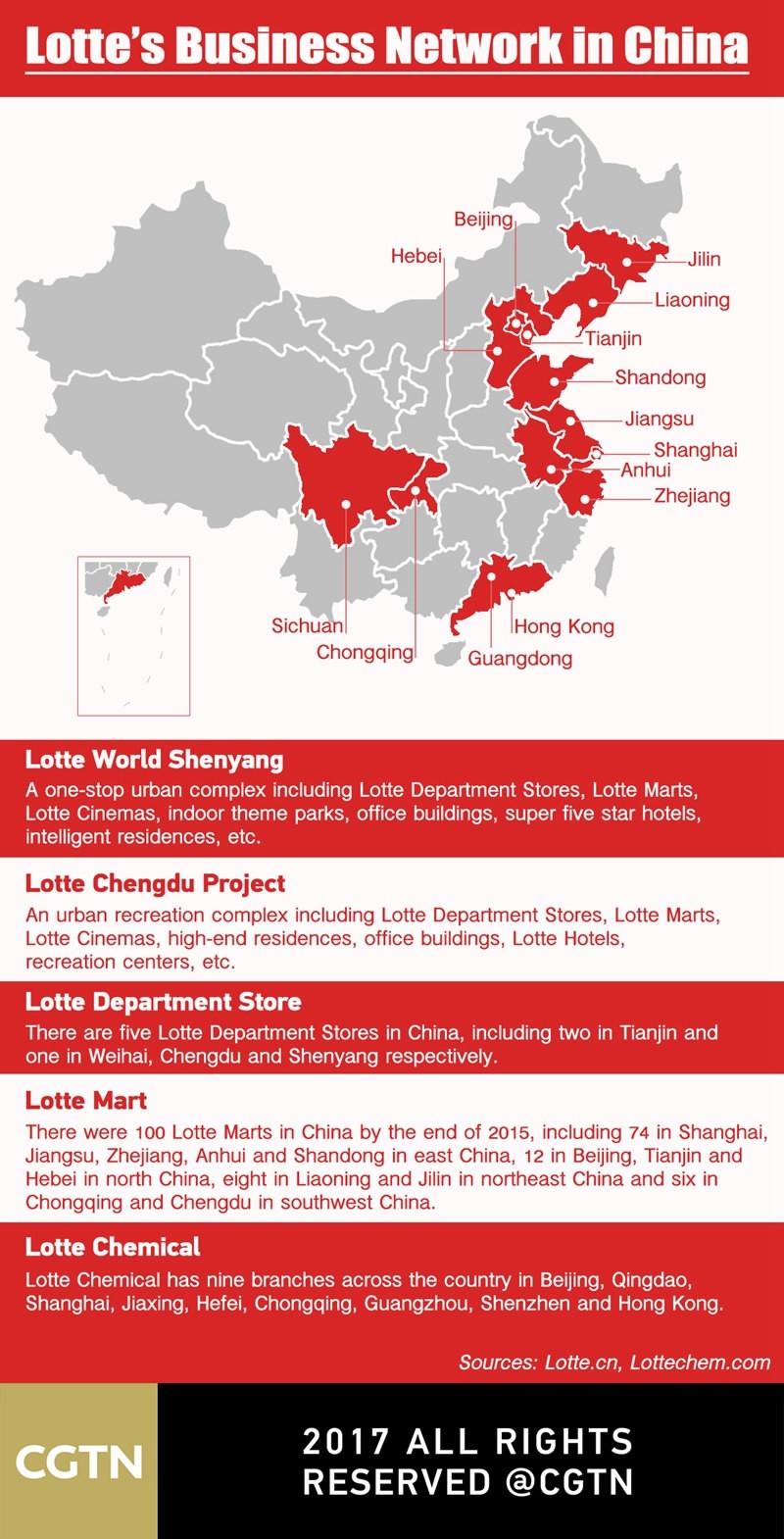
Lotte’s business network in China. /CGTN Photo
An affiliate of Lotte Group agreed to a land-swap with the South Korean government on Monday, according to which a golf resort owned by Lotte in Seongju in the southeastern part of the country will be used as a site for the missile defense system.
Since its entry into the Chinese market in 1994, Lotte has expanded its businesses in a variety of areas such as food, retail, tourism, the chemical industry, construction, manufacturing, finance and the service industry.
Despite the potential risk to sales, Lotte insists that it will cooperate with the South Korean government “on matters regarding national security.”
Reactions among ordinary citizens
Chinese citizens living in China are vowing to close their wallets to show their opposition to Lotte and the deployment of THAAD in South Korea.
“I will never shop at a Lotte Mart again and never go to South Korea,” a Chinese man living in Wangjing, an area in northeastern Beijing with a big South Korean community, told CGTN Digital.
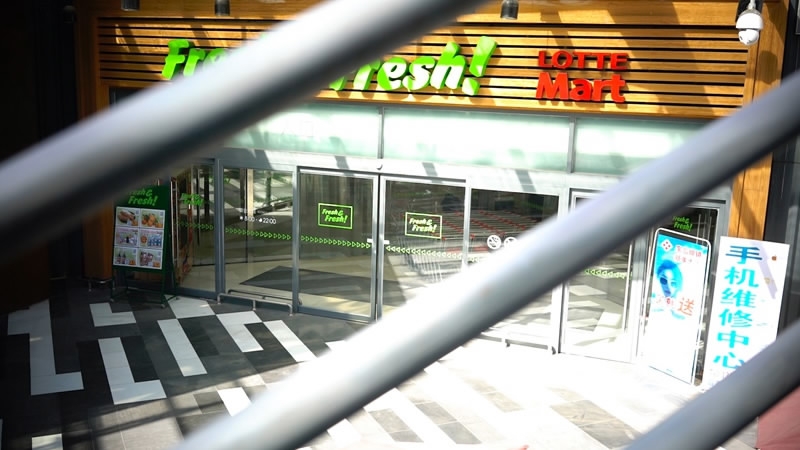
There were few shoppers at a Lotte Mart in the Wangjing area of Beijing on March 1, 2017. /CGTN Photo
“I used to buy some daily commodities at the Lotte Mart, which is near my home,” said a man in his 30s. “But after the THAAD incident, I will go there less often.” He added that Lotte’s move is a “provocation to the Chinese people.”
A group of people protested in front of a Lotte Mart in Jilin city of northeast China’s Jilin Province on Sunday, holding slogans urging Lotte Group to “get out of China.”
On Chinese social media platform Sina Weibo, netizens have repeatedly voiced their anger at Lotte and South Korea. “Lotte is on my permanent blacklist,” wrote a netizen named “Daiir_y”.
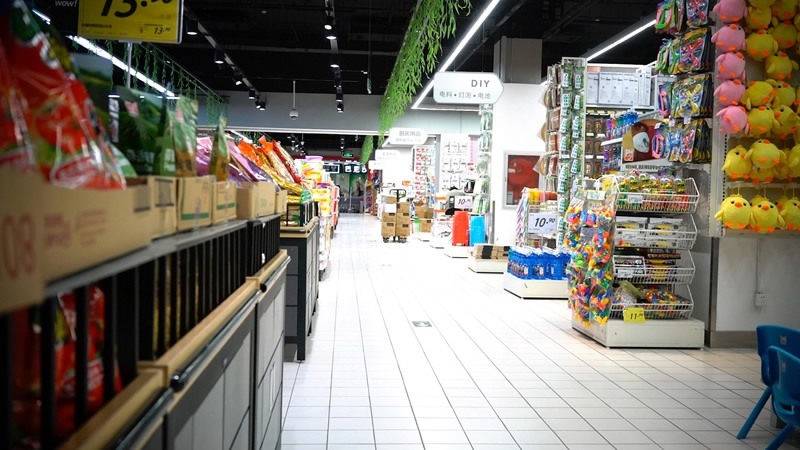
There were few shoppers at a Lotte Mart in the Wangjing area of Beijing on March 1, 2017. /CGTN Photo
Over 95 percent of respondents to a survey by China’s Huanqiu.com, taken before the land-swap between Lotte and the South Korean government was confirmed, said they would boycott Lotte if the deal was approved.
South Koreans living in China have also been impacted by the controversy.
“Of course my business here has been affected,” said a South Korean designer in Wangjing who has been working in China for over a decade. He added that he opposes the deployment of THAAD.
“Personally I’m against the deployment of THAAD,” another South Korean man said, adding that the deployment should be postponed and the deal with the US renegotiated.
Lotte projects in China may pay painful price
Experts in China are critical of the moves of South Korea and Lotte on THAAD, and have warned that there will be consequences.
Military commentator Major General Luo Yuan pointed out in an article published on an official social media account of PLA Daily that under the THAAD system, the radar’s detection range can extend as far as 1,000 kilometers, covering the northern and northeastern regions of China as well as the Russian Far East.

A barbed-wire fence is set up around a golf course owned by Lotte, where the US THAAD system will be deployed in Seongju, South Korea on March 1, 2017. /CFP Photo
“The United States is trying to create a ‘mini-NATO’ in Asia, which puts South Korea on the frontier of confrontation between the US and China and Russia,” said Luo.
“In regard to the public provocation by Lotte Group in cooperation with the South Korean government, it cannot be ruled out that China may take necessary countermeasures against South Korean industrial chains and business chains related to the deployment of THAAD,” said Luo, who emphasized that some Lotte projects in China may pay a “painful price” for the company’s decision.
He encouraged Chinese consumers to “say no” to Lotte and its product, for the company is making a huge amount of money while harming China’s national interests.
Luo’s opinions were echoed by other experts on military affairs and international studies.
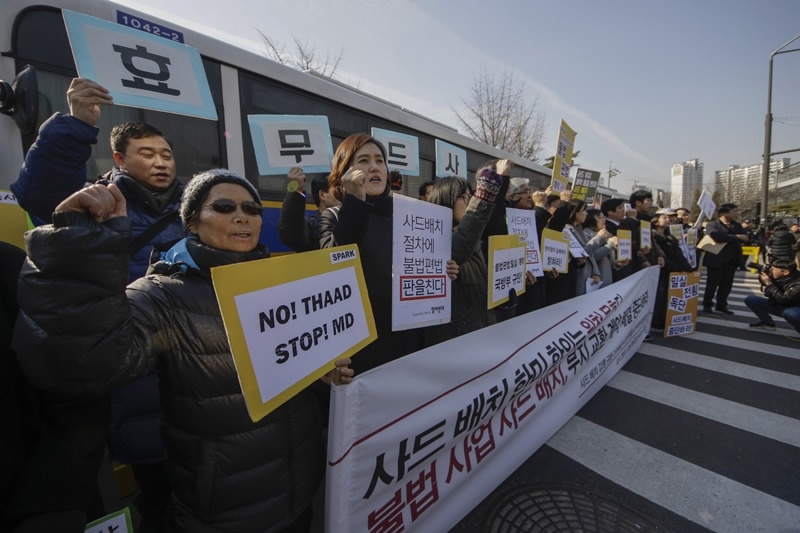
South Korean protesters stage a rally in front of the Defense Ministry in Seoul, South Korea on February 28, 2017 to oppose a plan to deploy the US THAAD system. /CFP Photo
The US will be able to get access to information on Chinese missiles through radars under THAAD, according to military expert Qian Liyan. “It will be like an outpost for the American armed forces,” he told Can Kao Xiao Xi, an outlet owned by Xinhua. “This is a reason why China resolutely opposes the deployment of THAAD in South Korea.”
“We must make it clear to South Korea that you cannot earn money from Chinese people on the one hand and do harm to China on the other,” said Ye Hailin, an expert on international studies from the Chinese Academy of Social Sciences.
Ye told Can Kao Xiao Xi that it is reasonable for Chinese netizens to condemn the deployment of THAAD in South Korea and for Chinese consumers to voluntarily boycott Lotte. “Attitudes of the Chinese people and the Chinese government are similar on this issue, which are forming a joint force,” he added.
Su Xiaohui, a researcher on international strategy at the China Institute of International Studies, told the Overseas Edition of People's Daily that the deployment of THAAD will damage mutual trust between China and South Korea as well as friendship among ordinary citizens on both sides.
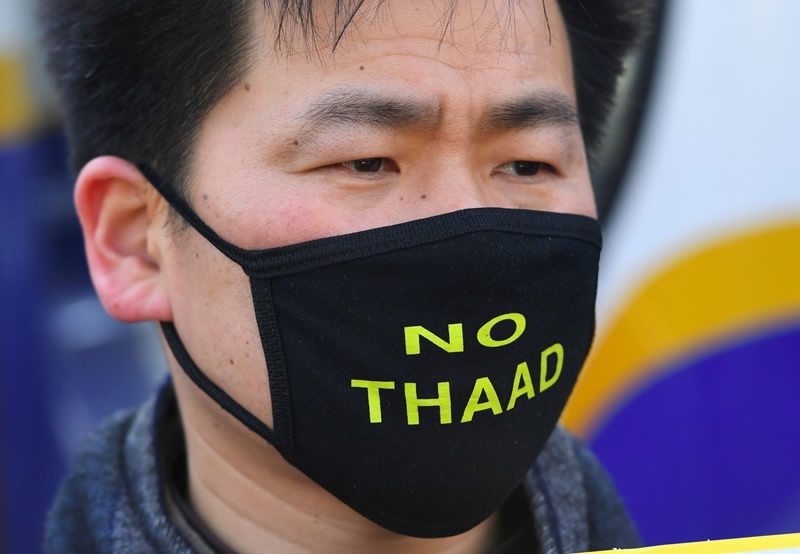
A South Korean protester wears a black mask reading "No THAAD" during a rally in front of the Defense Ministry in Seoul, South Korea on February 28, 2017 against the planned deployment of the US THAAD system. /CFP Photo
“China welcomes foreign enterprises to make investments and develop businesses in China and will protect lawful rights and interests of foreign enterprises in China according to law,” she said. “But public opinions can have a decisive impact on the operation of foreign enterprises.”
The Chinese Foreign Ministry has also repeatedly voiced its opposition to the deployment of THAAD in South Korea.
Geng Shuang, spokesperson of the Chinese Foreign Ministry, said at a press conference on Tuesday that recent protests against Lotte Group in China are an indication of the Chinese people’s stance towards South Korea’s deployment of THAAD.
“The relative parties know well of the Chinese people’s stance on the deployment of THAAD, and I believe they have noticed their voices,” said Geng, who warned that South Korea and the US will “have to bear all the resulting consequences” as China is determined to “take necessary measures to safeguard its security interests.”









